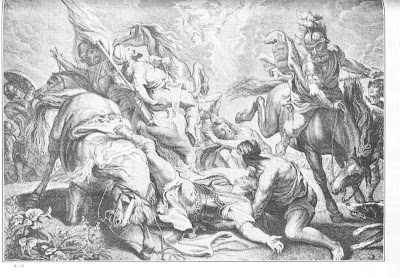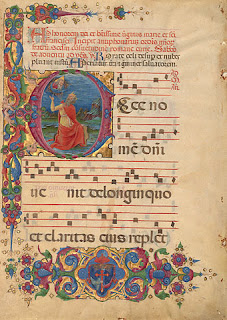TODAY'S SPECIAL: Isaiah 58:1-14
TO CHEW ON: "Is this not the fast I have chosen:
To loose the bonds of wickedness,
To undo the heavy burdens,
To let the oppressed go free,
and that you break every yoke?
Is it not to share your bread with the hungry,
And that you bring to your house the poor who are cast out;
When you see the naked that you cover him
And not hide yourself from your own flesh?" Isaiah 58:6-7
"Fasting is a powerful and effective part of the Christian life," begins a sidebar article about fasting in my Bible (
New Spirit-Filled Life Bible, p. 942).
Though the dictionary defines "fast" as abstaining partially or wholly from food, it seems that in our focus verse, God is telling the backslidden Israelites (through Isaiah) that they need to fast from something besides food.
These people are getting frustrated because their fasting isn't getting the expected results. Isaiah tells them why it isn't effective:
- Because they are treating it as mere ritual and not entering into the self-denial spirit of it:
"In fact, in the day of your fast you find pleasure and exploit all your labourers" Isaiah 58:3.
"[Is true fasting merely mechanical?] Is it only to bow down his head like a bulrush and to spread sackcloth and ashes under him [to indicate a condition of heart that he does not have]? Will you call this a fast and an acceptable day to the Lord?" Isaiah 58:5b - AMP. (emphasis added).
- Because they are treating it as a way to manipulate others and God:
"Indeed, you fast for strife and debate, and to strike with the fist of wickedness...To make your voice heard on high" Isaiah 58:4.
What, then is the fast that pleases God?
1. It is a fast from evil. It is ceasing unfairness, oppression, and putting heavy yokes on others (Isaiah 58:6). In other words, we can't expect results from fasting when we're living in blatant sin.
2. It is a fast from self-absorption. It is ceasing to see only our own little world, opening our eyes to the needs of others--the hungry, the poor, even one's own family--and responding with practical help: food, shelter, clothes, compassion.
We could sum up by saying that
the fast from food that pleases God begins with the right attitude. It begins with a focus on the things that are important to Him.
The sidebar article with which I began continues:
"Jesus taught that some things are resolved only through prayer and fasting (Mark 9:29). However, fasting and personal holiness are acceptable to God only when we have our priorities straight....Fasting becomes offensive in God's sight when we ignore the people closest to His heart, the poor, the oppressed, and the needy." Keith W. Phillips, New Spirit-Filled Life Bible , p. 942.
, p. 942.
PRAYER: Dear God, help me in my observances of spiritual disciplines like fasting, to begin by understanding Your heart for it, and for me through it. Help me to align my priorities with Yours. Amen.
MORE: The purpose of fasting
"It is sobering to realize that the very first statement Jesus made about fasting dealt with the question of motive (Matthew 6:16-18). To use good things to our own ends is always the sign of false religion. How easy it is to take something like fasting and try to use it to get God to do what we want. At times there is such stress upon the blessings and benefits of fasting that we would be tempted to believe that with a little fast we could have the world, including God, eating out of our hands.
Fasting must forever center on God. It must be God-initiated and God-ordained. Like the prophetess Anna, we need to be "worshiping with fasting" (Luke 2:37). Every other purpose must be subservient to God."
- Richard Foster, Celebration of Discipline , pl. 54.
, pl. 54.
**************
Unless otherwise noted all Scripture quotations are taken from the New King James Version®. Copyright © 1982 by Thomas Nelson, Inc. Used by permission. All rights reserved.
Scripture quotations marked AMP are taken from the Amplified® Bible. Copyright © 1954, 1958, 1962, 1964, 1965, 1987 by The Lockman Foundation. Used by permission"(www.Lockman.org).





















